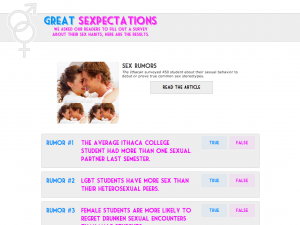Rebecca* stood outside her downtown Ithaca apartment in a bathrobe. She kissed the boy she had just had sex with good night and put him in a cab to take him home. From that same cab emerged the next boy she’d have sex with that night.
“A very wise man told me once that everyone has a ‘slut phase,’” Rebecca said. “Whether or not they’re successful is another thing, but everyone definitely has their slut phase, men included.”
Rebecca said the last semester that she was single she had 12 sexual partners. According to an online survey conducted by The Ithacan, Rebecca is among only 0.4 percent of women who had six or more sexual partners last semester. The survey polled 450 students at Ithaca College and showed that overall, the LGBT community is more sexually active than straight students, women are less likely to regret drunken sexual encounters than men, and students believe fellow students are having more sex than they actually are.
Psychologist Ritch Savin-Williams, professor of human development and director of the sex and gender lab at Cornell University, said the tendency to think people are having more sex than they are comes down to what he calls “selective attention.”
“One listens to all the people that are talking about it, but what they don’t take note of is all the people who are not talking about it,” Savin-Williams said.
Nationally, nearly three-quarters of college students had one or no sexual partners in the last 12 months, according to the Spring 2011 American College Health Association’s National College Health Assessment. At the college, more than 65 percent of students reported having one or zero sexual partners last semester.
Freshman Elliot Castillo had no sexual partners last semester — not because Castillo can’t pick up a girl, he said, but because he chooses to remain celibate.
“I don’t want to get distracted from my career goals,” he said. “I don’t need a baby trying to suck up my energy.”
Castillo said his choice to stray from sex came after he had sex with three people, all of whom he dated in high school and said were special to him. He said he thinks the media features “ladies’ men” in teen and young adult shows, which leads to the misconception that people have more sex than they do.
“Everyone wants that one story where they’re like, ‘I was so drunk last night, I got with this girl …’” he said. “That kind of story lacks perspective just because it’s seen in the media as cool.”

While 27.1 percent of women at the college had no sexual partners last semester, only 23.7 percent of men could say the same. Nationally, about 30 percent of both male and female students reported having no sexual partners for the past 12 months, according to the Spring 2011 ACHANCHA survey.
In the spring assessment, 7 percent of male students reported having six or more sexual partners over the course of the last year, compared with only
3 percent of female students. In a single semester, 8.6 percent of male students who took The Ithacan’s survey reported having six or more sexual partners. Less than 0.5 percent of female students reported the same.
Though men report having more sex than women both at the college and nationally, junior Christie DelVaglio said women still get saddled with derogatory terms like slut and whore.
“That’s such an old stereotype that we need to stray away from,” she said. “You can’t say that women are ‘sluts’ and ‘whores’ in today’s world when society is so supportive of the strong female image. It’s a completely outdated thought.”
Men at the college aren’t only having more sex than women, they also tend to drink more. While the average male student at the college reports having five to six drinks on a night out, the average female student only has three to four.
Nearly 95 percent of students who took the survey said sexual encounters are more likely when they are intoxicated, and the majority said they think students are likely to regret these encounters. More men said they have regretted drunken sexual encounters than women.
“I look at sex as being fun, especially when drunk,” DelVaglio said. “I can’t say that I’ve regretted any sexual experiences.”
Rebecca said she regrets some sexual experiences she had while she was drinking.
“You have these warm, fuzzy feelings, and even the worst ideas are awesome,” she said. “I definitely have had those times where I probably wouldn’t have gotten involved so quickly with guys if I weren’t drunk, but I feel like, ‘Whatever, I’m drunk, let’s just do this.’”
Sophomore Garen Whitmore, who identifies as gay, said some sexual decisions students make may lead to regret afterward.
“There are very few times I’ve had sex with someone who wasn’t a boyfriend,” he said. “The only times that I have were really disappointing.”
More than three-quarters of students at the college who identified as LGBT have had sexual encounters under the influence of alcohol, and nearly half have regretted them. This means LGBT students are more likely to regret drunken sexual experiences than students who identify as heterosexual.
“When I was questioning my sexuality, I was extremely depressed,” Whitmore said. “I think that in a college setting it’s easier to have that depression or even just confusion be expressed in ways that are encouraged by our peers, such as having sex, drinking or getting high.”
Lis Maurer, LGBT education, outreach and services program director at the college, said students who are discovering their sexual orientation may have higher rates of sexual encounters, alcoholism and drug use.
Savin-Williams said there are some individuals who feel they must have sexual experiences with people before they know for sure who they are attracted to, but some surveys suggest LGBT alcohol use is not as high as is commonly perceived.
“There are mixed results in other surveys whether or not LGBT people drink more or not, so that ‘fact’ is not established,” he said.
Maurer said there’s a myth that LGBT people have sex more than straight people
because the word “sexual” is in the phrase “sexual orientation.”
“There are many LGBT people that are not sexually active but know their orientation,” Maurer said. “Just as there are heterosexuals that aren’t sexually active but know that they’re attracted to the
opposite sex.”
For Rebecca, sexual decisions are personal and she said everyone has to find their own comfort zone.
“Sex can be magical and beautiful, and at the same time horrendous and awful,” she said. “To find that line you need to find yourself, which is what we’re here to do in college anyway.”
*Names have been changed to protect anonymity.





